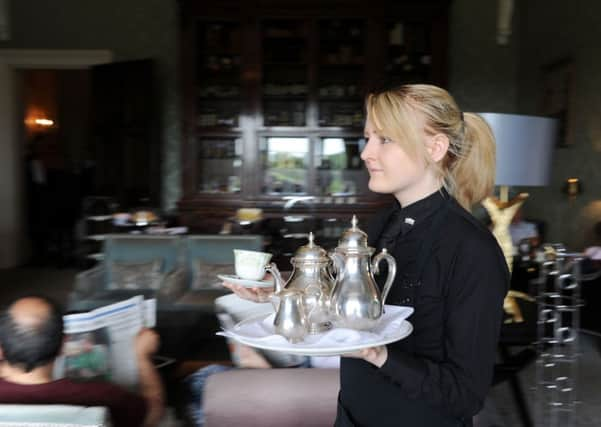Ukraine a shadow over the services sector


The Markit/CIPS services purchasing managers’ index (PMI) registered 60.5 last month, up from 59.1 in July and well above the benchmark of 50 which indicates growth.
However, the index suggested that some companies are struggling to keep up with demand, something the Bank of England is likely to take note of when it meets today to discuss the possibility of interest rate rises.
Advertisement
Hide AdAdvertisement
Hide AdThe strength in services contrasts with a slight cooling in the manufacturing sector, which has been hit by concerns that the conflict in Ukraine could escalate further.
A survey of manufacturing, published earlier this week, showed the pace of growth slowed to a 14-month low in August.
But the leap in services was strong enough to take the composite PMI for Britain’s private sector as a whole to its highest level since November.
The survey could pose a challenge to the Bank of England’s prediction, which was reiterated in August, that the economy will slow down slightly in the second half of 2014.
Advertisement
Hide AdAdvertisement
Hide AdTwo bank policy makers broke ranks and voted last month in favour of an interest rate rise in response to the strong recovery in the economy.
Despite the pick-up, the bank is likely to keep rates on hold at its September policy meeting which ends today.
Most economists are predicting a rate increase early next year.
Chris Williamson, chief economist at Markit, is forecasting another quarter of strong economic growth in the third quarter, similar to the 0.8 per cent rate of expansion seen in the first two quarters of the year.
Advertisement
Hide AdAdvertisement
Hide AdMr Williamson said the figures provide further ammunition for policy makers arguing for higher interest rates.
“The worry is that growth remains too dependent on the domestic economy, raising the risk that higher interest rates will derail the upturn,” he said.
“Any hopes of a rebalancing towards exports have been dealt a blow by the escalating Ukraine crisis.”
CIPS chief executive David Noble also warned there were signs that services growth may be close to peaking, with confidence among firms weakening to a 15-month low due to worries over the strength of business pipelines.
Advertisement
Hide AdAdvertisement
Hide AdHe said: “There are signs that the sector is feeling the pinch from capacity pressures as backlogs of work lengthen.”
Payroll numbers rose for the 20th month in a row, although growth was the slowest seen since March.
CIPS added that the service sector looked increasingly competitive in August, with businesses unable to push higher costs on to customers. Howard Archer, chief UK and European economist at IHS Global Insight, said: “With Governor Mark Carney stressing that the strength of data will drive when the Bank of England will first edge up interest rates, the overall robust set of August purchasing managers’ surveys keeps open the possibility that the bank could act before the end of 2014.
“However, we now think it is most likely that the Bank of England will hold off from raising interest rates until the early months of 2015 given low inflation, still very weak earnings growth and the downside risks to growth coming from heightened geopolitical tensions and stuttering eurozone economic activity.
Advertisement
Hide AdAdvertisement
Hide Ad“What does seem certain is that the Bank of England will keep interest rates at 0.50 per cent at the end of the September MPC meeting.
“While two MPC members voted for a rate hike from 0.50 per cent to 0.75 per cent in August, the majority of the committee do not seem in any great hurry to act at the moment,” he added.
Samuel Tombs, senior UK economist at Capital Economics, said August’s PMI figure does not bolster the case for raising interest rates this year.
“The fall in the employment balance from 56.2 to 54.7 suggests that labour market slack is being used up at a slower pace and that productivity is now recovering ,” he said.
“In addition, the drop in the output prices index from 50.7 to 50.1 – its lowest level since May 2013 – confirms that price pressures remain subdued.”